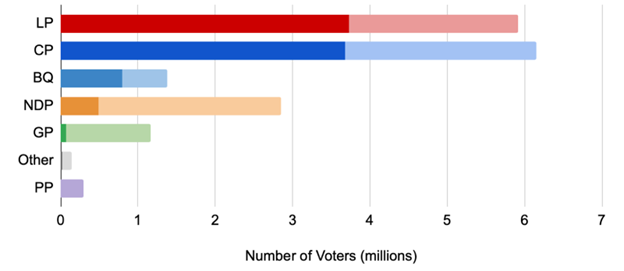As a follow-up to our last communication, we are still waiting for the government affidavits. It could be a few more weeks at this point, and we'll share any new updates as soon as possible. In the meantime, we're pleased to share more information from our case evidence.
Fair Voting BC Evidence
Over the past number of months, we’ve walked you through the evidence put forward by the four expert witnesses we invited to submit affidavits in this case: Profs. Nadia Urbinati (Columbia University), John Carey (Dartmouth College), Karen Bird (McMaster University) and Lawrence LeDuc (University of Toronto).
In addition to these experts, Antony Hodgson (president of Fair Voting BC and a professor at the University of British Columbia) also worked closely with some other experts (Byron Weber Becker (University of Waterloo) and Fred Cutler (University of British Columbia) to put together our own unique analyses to support our key contention that the First Past the Post voting system fails to effectively represent voters. In the coming few emails, we’ll share key insights.



Antony Hodgson (President, Fair Voting BC & University of British Columbia), Byron Weber Becker (University of Waterloo) and Fred Cutler (University of British Columbia).
The 2019 Canadian Federal Election
The first section of our affidavit reviews the results of Canada’s 2019 election in order to illustrate in our own national context some of the key problems described by the expert witnesses.
The first thing we pointed out was that “in a strong majority of ridings in the 2019 Canadian election (215 out of 338, or 63.6% of them), the winning candidate did not win a majority of votes. Many won significantly less. In particular, two candidates were elected with less than 30% of the votes cast in their ridings.”
While this is an interesting first point for the court to consider, we went on to make an even more important and central point by stating that it is important “to distinguish between votes cast for candidates who are elected and those that are not. We define a vote cast for an elected candidate as “effective”, as such a vote affects the composition of the legislature, and one cast for a candidate who is not elected as “ineffective”, as such votes do not have any effect on the composition of the legislature. Ineffective votes are commonly referred to as “wasted votes.””
“Of the 17.9 million voters who cast votes in 2019, a majority of over 9.1 million (51.0%) cast wasted votes.” This is the main fact that we plan to rely on in making our case - over half the voters do not have an MP they have voted for, and we will argue (based on Prof. Urbinati’s evidence) that this consequence of FPTP implies that these voters are not effectively represented.
In addition, “There was a strong link between a voter’s political preferences and the likelihood of casting a wasted vote, with supporters of some parties affected to a greater extent than others. Large majorities of voters who voted for the NDP, the Green Party, the People’s Party of Canada, or for independent candidates in the last election cast a wasted vote” (as well as significant numbers of Liberal and Conservative voters - see figure below), which means that certain kinds of voters (“characterized by political preference and region”) are systematically discriminated against.

Representation of effective votes (solid shades) and ineffective, or wasted, votes (lighter shades) cast by party in the 2019 Canadian federal election. An effective vote is one cast for a winning candidate, while a wasted vote is one cast for a losing candidate.
In upcoming messages, we’ll dive deeper into the rest of the evidence we’ve put together.
Voices from the Movement - Event Recording
A big thank you to those who attended the Voices from the Movement Session, presented by Unlock Democracy Canada. If you were unable to attend or would like to revisit, a recording of the session is available here.
Stay tuned to this blog for updates on electoral reform and the Charter Challenge for Fair Voting.
Get Charter Challenge updates by following SPRINGTIDE on Facebook and Twitter.
Sign up for email updates from the Charter Challenge for Fair Voting here:
By subscribing to this list you consent to being contacted by both Springtide and Fair Voting BC.
-
 Springtide Chair published this page in Blog Updates 2022-05-26 13:59:40 -0300
Springtide Chair published this page in Blog Updates 2022-05-26 13:59:40 -0300



